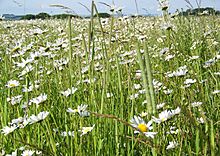Innsworth Meadow facts for kids
| Site of Special Scientific Interest | |

Example - Meadow with Oxeye Daisies (Leucanthemum vulgare)
|
|
| Area of Search | Gloucestershire |
|---|---|
| Coordinates | 51°53′36″N 2°13′02″W / 51.8932°N 2.2172°W |
| Interest | Biological |
| Area | 2.9 hectare |
| Notification | 1979 |
Innsworth Meadow is a special place in Gloucestershire, England. It is a 'Site of Special Scientific Interest' (SSSI). This means it is protected because of its important plants and wildlife. This meadow was officially recognized as an SSSI in 1979. It covers about 2.9 hectares. This is like the size of almost four football fields.
Contents
Where is Innsworth Meadow and What is it Used For?
Innsworth Meadow is located near the villages of Innsworth and Twigworth. It sits on a type of soil called 'Lower Lias clays'. These clays formed a long time ago.
This meadow is very special. It is one of the few 'unimproved neutral grasslands' left in the Severn Vale area. 'Unimproved' means it has not had lots of artificial fertilizers added. This helps many different plants grow naturally. Farmers use the meadow to grow hay for animals. They also let animals like cows graze there. This traditional use helps keep the meadow healthy and full of diverse plants.
Amazing Plants of Innsworth Meadow
Innsworth Meadow is an old 'ridge and furrow' grassland. This means the land has wavy patterns from old farming methods. These patterns help different plants grow. The meadow has been managed in traditional ways for a long time.
Common Grasses
The main types of grasses you will find here are Common Bent, Red Fescue, Crested Dog’s-tail, and Yorkshire Fog. These grasses are important for the meadow's ecosystem. They provide food and shelter for many creatures.
Beautiful Wildflowers
Many lovely flowering plants grow in the meadow. These include the bright yellow Cowslip, Pepper Saxifrage, and Yellow-rattle. You can also spot the cheerful Ox-eye Daisy and the deep red Great Burnet.
Two very special flowers found here are the Green-winged Orchid and Corky-fruited Water Dropwort. The Green-winged Orchid is quite rare. The Corky-fruited Water Dropwort is also uncommon. It grows in damp areas. Finding these plants shows how important this meadow is for nature.
Hedges and Trees
Around three sides of the meadow, there are thick hedges made of Hawthorn. These hedges provide homes for birds and insects. You can also see some Ash trees growing among the hedges. These trees add to the beauty and biodiversity of the meadow.

